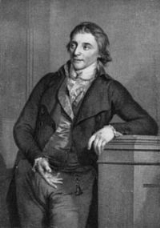
Justus Christian Loder
Encyclopedia
Justus Ferdinand Christian Loder (March 12, 1753 – April 16, 1832) was a German anatomist and surgeon
who was a native of Riga
.
In 1777 Loder earned his medical doctorate at the University of Göttingen, and the following year was appointed professor of surgery and anatomy at the University of Jena, where he would practice medicine for the next 25 years. At Jena
he was responsible for the establishment of an anatomical theatre and an Accouchierhaus (maternity house). In 1803 he transferred to the University of Halle, where he established a clinic of obstetrics
. After the closing of the University of Halle by Napoleon in 1806, he became personal physician to the Prussian royal family at Königsberg
.
Later he relocated to Russia, where in 1810 he became personal physician to Czar Alexander I
. Between 1814 and 1817 he was in charge of the military hospital in Moscow
. He died in Moscow on April 16, 1832.
From 1794 to 1803 he published Tabulae anatomicae, which was a masterpiece containing a complete collection of anatomical illustrations of the human body. This work was one of the largest and most comprehensive anatomical atlases in its time. During his career, Loder maintained on-going friendships with Christoph Wilhelm Hufeland
and Johann Wolfgang von Goethe
; both men having taken anatomy classes from Loder.
Surgeon
In medicine, a surgeon is a specialist in surgery. Surgery is a broad category of invasive medical treatment that involves the cutting of a body, whether human or animal, for a specific reason such as the removal of diseased tissue or to repair a tear or breakage...
who was a native of Riga
Riga
Riga is the capital and largest city of Latvia. With 702,891 inhabitants Riga is the largest city of the Baltic states, one of the largest cities in Northern Europe and home to more than one third of Latvia's population. The city is an important seaport and a major industrial, commercial,...
.
In 1777 Loder earned his medical doctorate at the University of Göttingen, and the following year was appointed professor of surgery and anatomy at the University of Jena, where he would practice medicine for the next 25 years. At Jena
Jena
Jena is a university city in central Germany on the river Saale. It has a population of approx. 103,000 and is the second largest city in the federal state of Thuringia, after Erfurt.-History:Jena was first mentioned in an 1182 document...
he was responsible for the establishment of an anatomical theatre and an Accouchierhaus (maternity house). In 1803 he transferred to the University of Halle, where he established a clinic of obstetrics
Obstetrics
Obstetrics is the medical specialty dealing with the care of all women's reproductive tracts and their children during pregnancy , childbirth and the postnatal period...
. After the closing of the University of Halle by Napoleon in 1806, he became personal physician to the Prussian royal family at Königsberg
Königsberg
Königsberg was the capital of East Prussia from the Late Middle Ages until 1945 as well as the northernmost and easternmost German city with 286,666 inhabitants . Due to the multicultural society in and around the city, there are several local names for it...
.
Later he relocated to Russia, where in 1810 he became personal physician to Czar Alexander I
Alexander I of Russia
Alexander I of Russia , served as Emperor of Russia from 23 March 1801 to 1 December 1825 and the first Russian King of Poland from 1815 to 1825. He was also the first Russian Grand Duke of Finland and Lithuania....
. Between 1814 and 1817 he was in charge of the military hospital in Moscow
Moscow
Moscow is the capital, the most populous city, and the most populous federal subject of Russia. The city is a major political, economic, cultural, scientific, religious, financial, educational, and transportation centre of Russia and the continent...
. He died in Moscow on April 16, 1832.
From 1794 to 1803 he published Tabulae anatomicae, which was a masterpiece containing a complete collection of anatomical illustrations of the human body. This work was one of the largest and most comprehensive anatomical atlases in its time. During his career, Loder maintained on-going friendships with Christoph Wilhelm Hufeland
Christoph Wilhelm Hufeland
Christoph Wilhelm Friedrich Hufeland was a German physician. He is famous as the most eminent practical physician of his time in Germany and as the author of numerous works displaying extensive reading and a cultivated critical faculty.-Biography:Hufeland was born at Langensalza, Thuringia and...
and Johann Wolfgang von Goethe
Johann Wolfgang von Goethe
Johann Wolfgang von Goethe was a German writer, pictorial artist, biologist, theoretical physicist, and polymath. He is considered the supreme genius of modern German literature. His works span the fields of poetry, drama, prose, philosophy, and science. His Faust has been called the greatest long...
; both men having taken anatomy classes from Loder.

